|
This is just a few of the many aero
cloner tubs people here have built...
Sportster built this one...
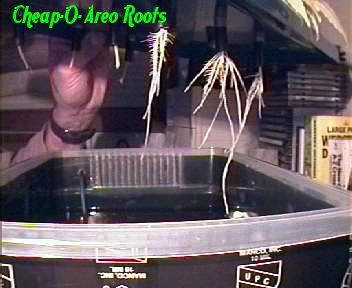
Those roots are beyond ready to get going in a dwc
bucket. :)
Sportsters second batch...Pretty big
leafy cuts there...
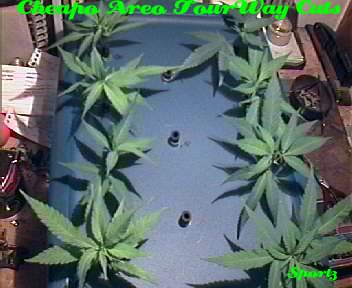
But...Sportster has another 'same size' tupperware
tub to use for a dome if needed for extra humidity that
those bigger untrimmed cuts might need.
Mia
Stoner...
Built this one which uses netcups which
can be either filled with growrocks for one clone per
site, or the netcup can be left empty with the five hole
cover in place for five clones per site.
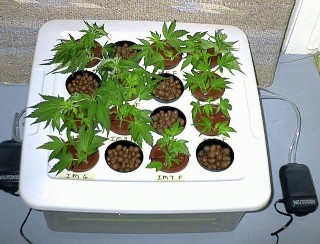
The netcups of grow rocks offer an advantage of
wicking the moisture to and away from the stems, which
performs quite well in some of the ready made expensive
cloning machines these days.
Bubbles a
pleanty...

Mias tub
uses four air curtain bubble wands and two dual outlet
pumps. It is capable of running either sixteen 3"
netcups of grow rocks for sixteen clones, or can run the
netcup covers for a total of 80 clones. :)
Wallbanger...
Recently built a cloner
which uses a cheap humidifier spinner device to splash
the clones.
Just like the expensive "rainforest"
cloning device only alot less expensive.
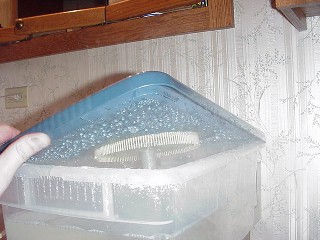
Farmer Maggot...
Built a bubble aero
cloner using a 5 gallon bucket for the tub.
Notice
the creative method of holding the clones using
styrofoam cups.
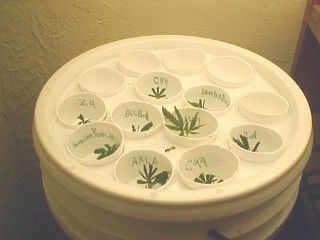
~Shabangs aero cloner tub...
Then theres the
water
pump type misting aero tub. ~Shabang made Hibes
design popular back at the old weedbase site. The
picture shows the inside of the large tub with the spray
bar plumbing pumping a fine water spray thru the pvc
tubes by way of a water pump (powerhead) in the bottom
of the tub.
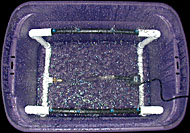
Thats
just the tip of the iceberg, there are too many
variations of aero cloning tubs and designs to show, but
they all share one common principle, the cut stems are
all suspended in open air while being showered by a fine
mist or spray of tiny water droplets.
The only
thing unique or different about the bubbler mist design
is the simple to build design, and the timer principle
of allowing the stems to dry off slightly between
mistings...thus encouraging faster rooting.
Aero
cloning has its share of ups and downs.
It can be
used successfully for soil growing situations, but it is
most ideally suited for hydroponic applications. Aero
cloning can be super simple as long as everything is
kept religiously clean. It offers super fast results
with minimal failures when you get everything right, but
like conventional cloning, it too can fail miserably if
you dont get all the details dialed in properly.
So in closing, if you already have another
method that works well for you then theres no need to
change it, unless you're growing hydroponically and want
high performance without the pitfalls of rockwool in
your hydro (DWC for example), then go for it.
AF
finds aero cloning the "only way to go" for all types of
growing, hydro as well as his soil grown mom plants.
He finds that the tedious task of conventional
cloning, the misting and daily dome rituals while the
clones look worse and worse going down hill every day,
suffering until they've finally rooted, to be a big
bummer as compared to the way aero clones look "almost
as good as the day they were cut", without going
downhill until they root, to be worth every penny of his
time invested.
My final word...*If you go out
and purchase a ready made unit for aero cloning, you'll
be kicking yourself for not building a "cheapo", its the
same operating principal for the whole lot of em.
*Not that theres anything wrong with spending
your cash on those store bought goodies from the grow
stores btw. ;)
Happy cloning to all,
10k |